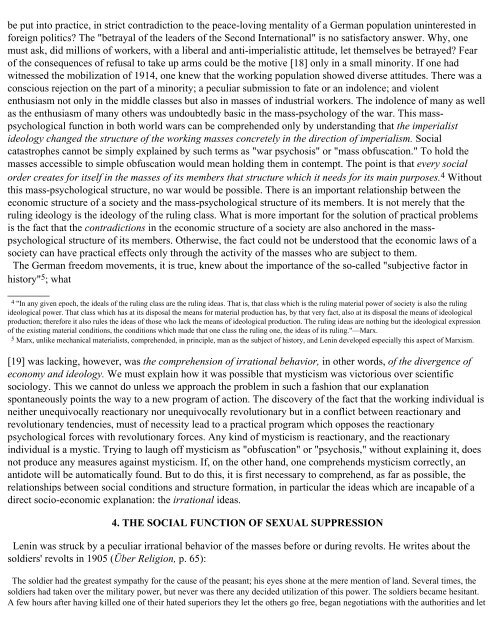The Mass Psychology of Fascism - Anxiety Depression Self-Help
The Mass Psychology of Fascism - Anxiety Depression Self-Help
The Mass Psychology of Fascism - Anxiety Depression Self-Help
You also want an ePaper? Increase the reach of your titles
YUMPU automatically turns print PDFs into web optimized ePapers that Google loves.
e put into practice, in strict contradiction to the peace-loving mentality <strong>of</strong> a German population uninterested in<br />
foreign politics? <strong>The</strong> "betrayal <strong>of</strong> the leaders <strong>of</strong> the Second International" is no satisfactory answer. Why, one<br />
must ask, did millions <strong>of</strong> workers, with a liberal and anti-imperialistic attitude, let themselves be betrayed? Fear<br />
<strong>of</strong> the consequences <strong>of</strong> refusal to take up arms could be the motive [18] only in a small minority. If one had<br />
witnessed the mobilization <strong>of</strong> 1914, one knew that the working population showed diverse attitudes. <strong>The</strong>re was a<br />
conscious rejection on the part <strong>of</strong> a minority; a peculiar submission to fate or an indolence; and violent<br />
enthusiasm not only in the middle classes but also in masses <strong>of</strong> industrial workers. <strong>The</strong> indolence <strong>of</strong> many as well<br />
as the enthusiasm <strong>of</strong> many others was undoubtedly basic in the mass-psychology <strong>of</strong> the war. This masspsychological<br />
function in both world wars can be comprehended only by understanding that the imperialist<br />
ideology changed the structure <strong>of</strong> the working masses concretely in the direction <strong>of</strong> imperialism. Social<br />
catastrophes cannot be simply explained by such terms as "war psychosis" or "mass obfuscation." To hold the<br />
masses accessible to simple obfuscation would mean holding them in contempt. <strong>The</strong> point is that every social<br />
order creates for itself in the masses <strong>of</strong> its members that structure which it needs for its main purposes. 4 Without<br />
this mass-psychological structure, no war would be possible. <strong>The</strong>re is an important relationship between the<br />
economic structure <strong>of</strong> a society and the mass-psychological structure <strong>of</strong> its members. It is not merely that the<br />
ruling ideology is the ideology <strong>of</strong> the ruling class. What is more important for the solution <strong>of</strong> practical problems<br />
is the fact that the contradictions in the economic structure <strong>of</strong> a society are also anchored in the masspsychological<br />
structure <strong>of</strong> its members. Otherwise, the fact could not be understood that the economic laws <strong>of</strong> a<br />
society can have practical effects only through the activity <strong>of</strong> the masses who are subject to them.<br />
<strong>The</strong> German freedom movements, it is true, knew about the importance <strong>of</strong> the so-called "subjective factor in<br />
history" 5 ; what<br />
________<br />
4 "In any given epoch, the ideals <strong>of</strong> the ruling class are the ruling ideas. That is, that class which is the ruling material power <strong>of</strong> society is also the ruling<br />
ideological power. That class which has at its disposal the means for material production has, by that very fact, also at its disposal the means <strong>of</strong> ideological<br />
production; therefore it also rules the ideas <strong>of</strong> those who lack the means <strong>of</strong> ideological production. <strong>The</strong> ruling ideas are nothing but the ideological expression<br />
<strong>of</strong> the existing material conditions, the conditions which made that one class the ruling one, the ideas <strong>of</strong> its ruling."—Marx.<br />
5 Marx, unlike mechanical materialists, comprehended, in principle, man as the subject <strong>of</strong> history, and Lenin developed especially this aspect <strong>of</strong> Marxism.<br />
[19] was lacking, however, was the comprehension <strong>of</strong> irrational behavior, in other words, <strong>of</strong> the divergence <strong>of</strong><br />
economy and ideology. We must explain how it was possible that mysticism was victorious over scientific<br />
sociology. This we cannot do unless we approach the problem in such a fashion that our explanation<br />
spontaneously points the way to a new program <strong>of</strong> action. <strong>The</strong> discovery <strong>of</strong> the fact that the working individual is<br />
neither unequivocally reactionary nor unequivocally revolutionary but in a conflict between reactionary and<br />
revolutionary tendencies, must <strong>of</strong> necessity lead to a practical program which opposes the reactionary<br />
psychological forces with revolutionary forces. Any kind <strong>of</strong> mysticism is reactionary, and the reactionary<br />
individual is a mystic. Trying to laugh <strong>of</strong>f mysticism as "obfuscation" or "psychosis," without explaining it, does<br />
not produce any measures against mysticism. If, on the other hand, one comprehends mysticism correctly, an<br />
antidote will be automatically found. But to do this, it is first necessary to comprehend, as far as possible, the<br />
relationships between social conditions and structure formation, in particular the ideas which are incapable <strong>of</strong> a<br />
direct socio-economic explanation: the irrational ideas.<br />
4. THE SOCIAL FUNCTION OF SEXUAL SUPPRESSION<br />
Lenin was struck by a peculiar irrational behavior <strong>of</strong> the masses before or during revolts. He writes about the<br />
soldiers' revolts in 1905 (Über Religion, p. 65):<br />
<strong>The</strong> soldier had the greatest sympathy for the cause <strong>of</strong> the peasant; his eyes shone at the mere mention <strong>of</strong> land. Several times, the<br />
soldiers had taken over the military power, but never was there any decided utilization <strong>of</strong> this power. <strong>The</strong> soldiers became hesitant.<br />
A few hours after having killed one <strong>of</strong> their hated superiors they let the others go free, began negotiations with the authorities and let


